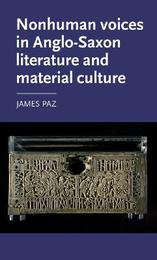
|
Nonhuman Voices in Anglo-Saxon Literature and Material Culture
Hardback
Main Details
| Title |
Nonhuman Voices in Anglo-Saxon Literature and Material Culture
|
| Authors and Contributors |
By (author) James Paz
|
| Series | Manchester Medieval Literature and Culture |
|---|
| Physical Properties |
| Format:Hardback | | Pages:248 | | Dimensions(mm): Height 216,Width 138 |
|
| Category/Genre | Literary theory
Literary studies - classical, early and medieval |
|---|
| ISBN/Barcode |
9781526101105
|
| Classifications | Dewey:829 |
|---|
| Audience | | Postgraduate, Research & Scholarly | |
|---|
| Illustrations |
6 black & white illustrations
|
|
Publishing Details |
| Publisher |
Manchester University Press
|
| Imprint |
Manchester University Press
|
| Publication Date |
13 June 2017 |
| Publication Country |
United Kingdom
|
Description
This book is available as an open access ebook under a CC-BY-NC-ND licence. Nonhuman voices in Anglo-Saxon literature and material culture uncovers the voice and agency possessed by nonhuman things across Anglo-Saxon literature and material culture. It makes a new contribution to 'thing theory' and rethinks conventional divisions between animate human subjects and inanimate nonhuman objects in the early Middle Ages. Anglo-Saxon writers and craftsmen describe artefacts and animals through riddling forms or enigmatic language, balancing an attempt to speak and listen to things with an understanding that these nonhumans often elude, defy and withdraw from us. But the active role that things have in the early medieval world is also linked to the Germanic origins of the word, where a thing is a kind of assembly, with the ability to draw together other elements, creating assemblages in which human and nonhuman forces combine. -- .
Author Biography
James Paz is Lecturer in Early Medieval English Literature at the University of Manchester -- .
Reviews'I thoroughly enjoyed my "tussle" with this book. I fought it sentence by sentence, and sometimes I could not agree, but the process changed my ideas about a lot of things that I thought I already knew. That is a significant achievement.' Jennifer Neville, University of London, Anglo-Saxon Literature and Material Cultures, Speculum 94.3 (2019) -- .
|